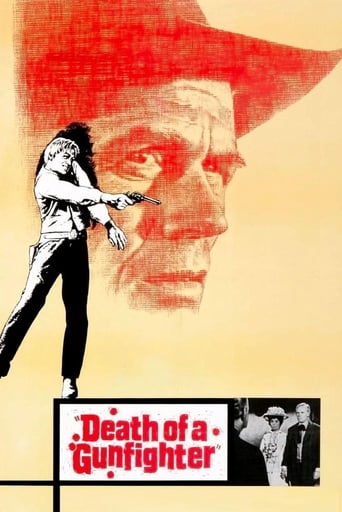krocheav
I had some initial hopes for this film, mainly because of an above average cast for a Universal western. If it had been made in the 40s or 50s it might have received a far better treatment but by the late sixties, it was looking too much like the tired old rehash of so many far better earlier westerns. Every cliché in the western book is endlessly paraded and bashed to death in this ponderous, out of its depth work. The script wallows in its 1969 new found grittiness, sex is added and talked about in keeping with the so-called new 'adult' approach to screen writing ~ not because it helps the story, but simply because now they could.... With two directors involved, it's fully understandable that no-one would want their names associated with the final product...so out they trundle 'Allen Smithee' to cover their tracks. Richard Widmark was worthy of a far better picture but at this point in his distinguished career I suppose offers were getting a little thin. The support characters (while mostly played by fine actors) are just about all cardboard copies of numerous other 'town verses lawman' westerns, but here they're tending to look rather ridiculous.There are several hints the sheriff has dirt on just about every member of the town council, but no advantage is ever taken of this angle, it all just dies away as another cliché on the way to the very obvious end.Some nice photographic angles, and a curious music score are the only relief to the general boredom on offer. Lena Horne is wasted within a thankless set dressing role. John Saxon is good as usual, but again his is an underdeveloped character. I dare say this was made with television in mind, as the claustrophobic TV back-lot look kills off any real atmosphere. For westerns that offer a good insight into the end of the old west, best try two earlier Universal International productions; "Lonely are the Brave" in '62 and in the mid 50s another 'little' western that managed to present a good script within a small budget; "A Day of Fury" with Jock Mahoney. Seems there remains a lot of easily pleased western fans out there, so if not overly discerning this may still offer varying degrees of interest. A friend kindly gave me a DVD of this movie for Christmas and while the Umbrella release has good image and sound quality it's being marketed under the six shooter 'classics' banner. As we constantly see with cable TV, the word 'CLASSIC' is bandied around very loosely and is to be taken equally as loosely!. If only they knew.....
SHAWFAN
How many times have I seen films on television which have astounded me with their depth and profundity and whose titles I have never heard before? Or which never come up in discussions of the classics? Death of a Gunfighter was one such movie. (The Devil's Doorway from 1950 with Robert Taylor is another.) Gazineo from Brasilia rightly compared DoaG with the Shootist (John Wayne) as portraying the passing of the frontier into more modern political structures. Especially the sharply etched scenes in the town council showing all the ethnics (Cathoic priest, Jewish merchant) being led around by the nose by the progressive Episcopalian (or whatever denomination he's supposed to be.) But there's one movie nobody has compared this film to: High Noon (Gary Cooper). DoaG is like a "High Noon noir." In High Noon the hero manages to conquer his enemies entirely on his own despite being deserted by the Establishment. But in DoaG the members of the whole establishment are the enemies and the hero does not manage to conquer them; on the contrary they get their own way most gruesomely in the end. This is somewhat of a unique plot in the history of westerns. Beautiful music by Oliver Nelson (1932-1975). What a loss to the movies! Imagine Carroll O'Connor in a pre-Archie Bunker role. That's a rarity in itself! When classic westerns are discussed DoaG must be included..
bengleson
There are some pleasant and perceptive touches to this parable of the passing of the old west and the inevitability of the arrival of civilized society. This film mirrors at least two other films from 1969, BUTCH CASSIDY AND THE SUNDANCE KID and THE WILD BUNCH. All three films try to capture the sunset of their anachronistic characters. Pike Bishop and Frank Patch have much in common. There is no room for them anymore in the West they knew. Bishop and Butch and Sundance light out for sunnier climes only to meet explosive endings. Frank Patch sees himself as a force for stability, a safeguard against primal urges that simmer on the surface and are kept in check only because he is the law. He underestimates the political climate of his town and the passion the town burghers are willing to unleash to remove him from office. Rather then move on, he is compelled to stay. I would especially like to recommend the pastoral scene where the local politicos convoy out to the fishing hole where Patch and young Dan are spending the day. It is a beautiful composition.
Brian W. Fairbanks
Started by Robert Totten, then taken over by Don Siegel at the insistence of Richard Widmark (Totten and the star "clashed," as they say), "Death of a Gunfighter" wound up credited to the fictitious and now somewhat famous Alan Smithee. This intriguing Western remains the elusive director's best work, thanks, no doubt, to the proven skills of Siegel and another terrific Widmark performance (the director and star had previously collaborated on "Madigan" a year earlier). As sheriff Widmark's love interest, Lena Horne hasn't much to do, but she looks good doing it.





